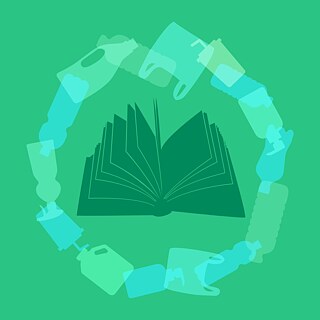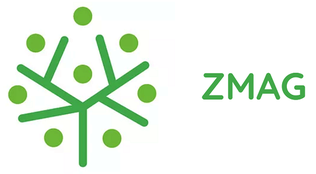Common Waste
Ideathon in Zagreb
During these three days, they learned about the waste problem, sustainable design and listened presentation of the good green library from the city of Karlovac in Croatia. Aside from learning, an even more important task for them was to set up transnational teams that would work on their ideas in the upcoming months. They initialized their ideas, discussed it, and created the teams on the second day of the training. This was a dynamic and intense process, so it was good that we were doing it in nature, at the Recycled Estate, a home of the project partner – Green Network of Activist Groups. Recycled Estate is an eco-social educational centre for permaculture design and sustainable living so participants were able to see how it looks when in practice someone tries to connect sustainability, commons, waste reduction, circular economy, and many more areas at once.
Like in a proper Ideathon and design thinking process, participants were boiling and framing, flying up and landing on the ground their ideas. During their internal discussion and as inputs from the facilitator and three mentors, ideas were further reframed and questioned, improved and clarified, and changed a bit or a bit more. We ended up with four teams that consisted not only of participants from different countries but also of participants who had different backgrounds. That means they are active at their workplace, in local communities, and in society by having different roles: librarians, activists for waste issues and sustainability, learners about the circular economy, and students or practitioners in design. They cover all of the most important topics of the project Common Waste - Common Libraries. Since the main goal of the project was to connect these areas with improvements in the library areas, it is interesting to list the final outcome of the Ideathon and four teams:
Co-Lib - supporting educational toolkit for librarians
Sustainable neighbors - survey on the state of the art in the libraries and educational program on sustainability for the librarians
Change the Script - using the theatre performance and reuse of paper in the pursuit of falling in love with the books
Book it - an idea that praises circularity with the reusing of paper to produce mushrooms that will end up like a possible construction material to implement in libraries
On the last day of Ideathon we came back to the library at Goethe-Institut Zagreb and that day was devoted to fine-tuning the project ideas and their presentation in front of the audience with Q&As. We have quite a diverse teams and ideas, so the next step is to polish and test them until September 2024.
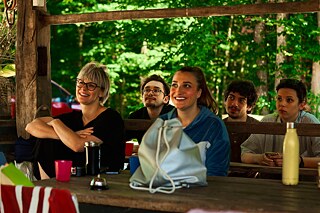
Second day of Ideathon: Start of teambuiling and design thinking process at the Recyle Estate in Vukomerić | © Goethe-Institut/Matej Marjanović
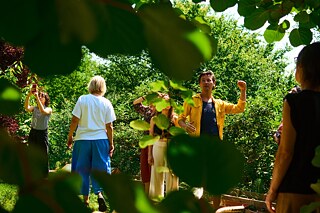
Drazen Šimleša (ZMAG) guides through the eco-social educational centre for permaculture design and sustainable living “Recycle Estate” | © Goethe-Institut/Matej Marjanović
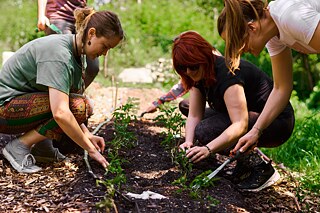
Warm up: The participants take on various tasks in nature | © Goethe-Institut/Matej Marjanović
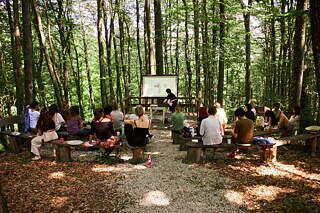
Ivana Borovnjak gives a lecture on Meaningful Design | © Goethe-Institut/Matej Marjanović
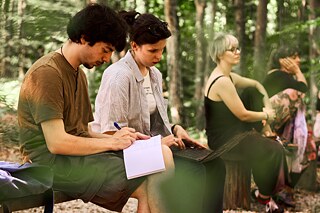
The participants are listening and taking notes of the lecture | © Goethe-Institut & Matej Marjanović
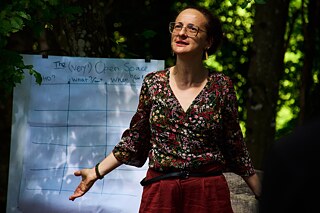
The Open Space: Facilitator Yanina Taneva explains the process of design thinking to the particpants | © Goethe-Institut/Matej Marjanović
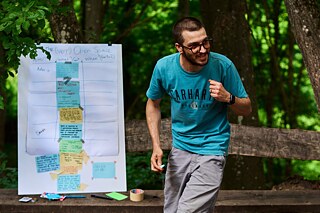
Participant Thomas presents his first project idea in the panel and seeks team members | © Goethe-Institut/Matej Marjanović
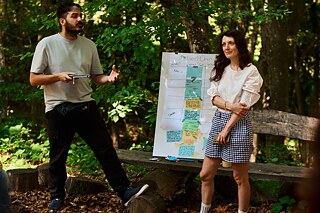
Participants Nikolas and Maria present their first project idea in the panel | © Goethe-Institut/Matej Marjanović
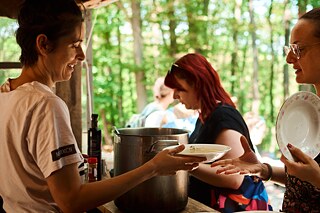
Break: vegan lunch from the open kitchen | © Goethe-Institut/Matej Marjanović
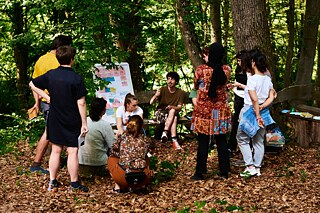
Group discussions between the participants and the mentors | © Goethe-Institut/Matej Marjanović
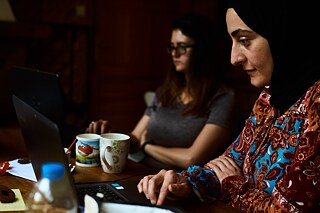
Participants Hilal (l.) and Meliha (r.) are working on their final presentation for the last day of Ideathon | © Goethe-Institut/Matej Marjanović
Participants
About
The Open Call was aimed at students, young professionals and activists coming from the fields of arts, ecology, sustainability and circular economy. We are were looking for librarians who are interested in libraries as sustainable institutions.
Our ambition is bringing together a group of creative minds to work together on formats relating to the topics mentioned above. The intention is to strengthen libraries as places of informal learning and exchange.
From June to November 2024, Common Waste – Common Libraries is taking place with a programme of live and online formats.
A group of 17 people was selected to take part in the project, starting with a three-day Ideathon in Zagreb (5 - 7th June). During the Ideathon, transnational teams were formed and the participants received input and inspiration from mentors and experts.
In the following months the participants will develop in their teams educational formats for use and implementation in libraries (such as workshops, simulation games, board games, waste detox kit) until September.
The project language is English. The participants are from the following countries: Greece, Bosnia and Herzegovina, Bulgaria, Croatia, Romania, Serbia and Turkey.
If you have any questions, please contact us at: bib-zagreb@goethe.de
| 5 - 7 June | Ideathon in Zagreb |
| June – September | Development and Production phase with 3 Online-Workshops |
| End of September | Final Event Online – Presentation of the products (open to public) |
| Till November | Implementation in libraries |
In our ecosystems there is no waste: everything is interconnected and rounding in circles. It is one of the basics, one of the principles, a pattern in the web of life on our planet. It is rooted in the sustainability of our planet. To understand this web of life, our ecosystems, but also our role within it, our connectivity and our responsibility we need more information and know-how about relationships within this triangle sustainability – waste reduction – circular economy. Common Waste is intended to expand knowledge and strengthen sustainable, environmentally conscious behaviour in society.
In our ecosystems, there is nothing like an isolated unit. Therefore, we consider that these questions are not just a matter of any individual. Yes, everything starts with us, but nothing ends. Questions and solutions, ideas and innovative approaches that we want to raise through this project are a matter of collective or teamwork. By working in teams, and with the support from the mentors, we will create a concrete ideas and actions to improve situation in waste area or to use circular economy approach to strengthen sustainability.
Our actions nourish a global view on horizon, but are based in our local communities, places where we work and live, places where we can be active citizens. And we consider libraries as places of and for local communities. Places where we can get information and educate ourselves, places where we can meet each other and discuss important things. Places where we act together to make this world a better place to live. Our common places.
Partners
Common Waste is being realised by the Goethe-Institut in Athens, Belgrade, Bucharest, Istanbul, Sarajevo, Sofia, Thessaloniki and Zagreb in cooperation with our partner Green Network of Activist Groups (ZMAG).
